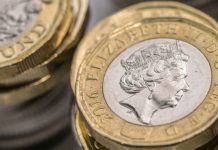After dipping early on Tuesday, the pound regained some strength versus the euro as it moved towards the end of the day. Sterling sunk to a low of €1.1369 before pushing upwards to €1.1433 mid-afternoon. The pound has rallied over 6% against the euro from its recent low in late August.
| What do these figures mean? |
|---|
|
When measuring the value of a pair of currencies, one set equals 1 unit and the other shows the current equivalent. As the market moves, the amount will vary from minute to minute. For example, it could be written: 1 GBP = 1.13990 EUR Here, £1 is equivalent to approximately €1.14. This specifically measures the pound’s worth against the euro. If the euro amount increases in this pairing, it’s positive for the pound. Or, if you were looking at it the other way around: 1 EUR = 0.87271 GBP In this example, €1 is equivalent to approximately £0.87. This measures the euro’s worth versus the British pound. If the sterling number gets larger, it’s good news for the euro. |
Strong UK retail sales data boosted the pound, pushing it to a 10-week high versus the common currency. The data showed that UK retail sales figures hit a 2 year high as household’s brush aside falling wages in real terms and rising prices, and continue to spend. This is both good and bad news. I’s good news for the economy that consumers are still spending; and potentially bad news if the spending is being done on credit to bridge the gap between a falling income and rising prices. If this is the case, there could be an increasing number of defaulters against credit card loans, and that could be damaging for the economy. Today, however, the pound focused on the good news, jumping after the release of sales data.
| Why does strong economic data boost a country’s currency? |
|---|
| Solid economic indicators point to a strong economy. Strong economies have strong currencies because institutions look to invest in countries where growth prospects are high. These institutions require local currency to invest in the country, thus increasing demand and pushing up the money’s worth. So, when a country or region has good economic news, the value of the currency tends to rise. |
There are two key events for pound traders today. First, the Bank of England (BoE) Governor Mark Carney will speak this morning . Since the BoE has already given a strong hint that interest rates could rise in the coming months, the risk is actually to the downside. Any signs that the BoE is pulling back even slightly from what these comments had indicated could cause the pound to fall.
| Why do raised interest rates boost a currency’s value? |
|---|
| Interest rates are key to understanding exchange rate movements. Those who have large sums of money to invest want the highest return on their investments. Higher interest rate environments tend to offer higher yields. So, if the interest rate or at least the interest rate expectation of a country is relatively higher compared to another, then it attracts more foreign capital investment. Large corporations and investors need local currency to invest. More local currency used then boosts the demand of that currency, pushing the value higher. |
Secondly, consumer confidence data is due to be released later this evening. Consumer confidence has been depressed over the summer months, hitting its recent low point in July. Low consumer confidence tends to go hand in hand with a weakening economy as household hold back from larger purchases. Should the reading come in below the -11 points forecasted by the analysts, the pound could fall.
Will eurozone inflation data encourage ECB to raise rates?
Euro traders have spent much of the week grappling with the election results in Germany. Today finally gives them something else to consider, in the way of inflation data. Inflation in the Eurozone has been stubbornly low over recent months, refusing to budge higher. The European Central Bank (ECB) has said that they are cautious about raising interest rates until inflation moves towards the 2% target level. Therefore, if today’s data shows inflation rates climb higher, investors will see this as an increased chance of an interest rate rise, which will boost the euro. Alternatively, inflation below the 1.8% forecast will have the reverse effect.
|
This article was initially published on TransferWise.com from the same author. The content at Currency Live is the sole opinion of the authors and in no way reflects the views of TransferWise Inc. |





